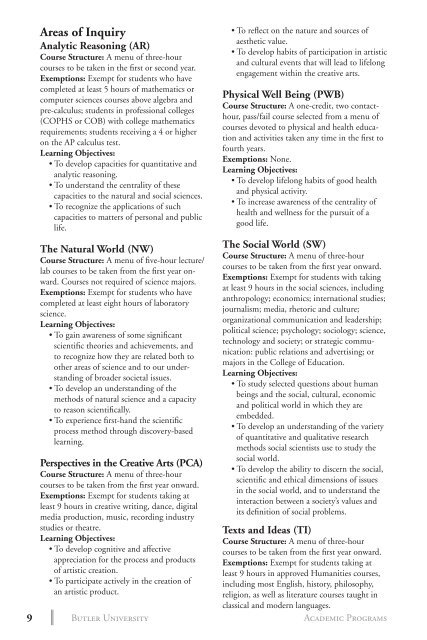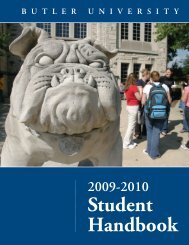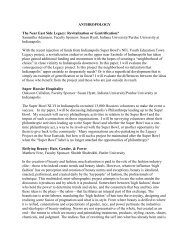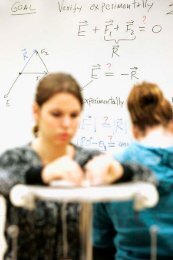2 0 1 3 bulletin - Butler University
2 0 1 3 bulletin - Butler University
2 0 1 3 bulletin - Butler University
Create successful ePaper yourself
Turn your PDF publications into a flip-book with our unique Google optimized e-Paper software.
Areas of Inquiry<br />
Analytic Reasoning (AR)<br />
Course Structure: A menu of three-hour<br />
courses to be taken in the first or second year.<br />
Exemptions: Exempt for students who have<br />
completed at least 5 hours of mathematics or<br />
computer sciences courses above algebra and<br />
pre-calculus; students in professional colleges<br />
(COPHS or COB) with college mathematics<br />
requirements; students receiving a 4 or higher<br />
on the AP calculus test.<br />
Learning Objectives:<br />
• To develop capacities for quantitative and<br />
analytic reasoning.<br />
• To understand the centrality of these<br />
capacities to the natural and social sciences.<br />
• To recognize the applications of such<br />
capacities to matters of personal and public<br />
life.<br />
The Natural World (NW)<br />
Course Structure: A menu of five-hour lecture/<br />
lab courses to be taken from the first year onward.<br />
Courses not required of science majors.<br />
Exemptions: Exempt for students who have<br />
completed at least eight hours of laboratory<br />
science.<br />
Learning Objectives:<br />
• To gain awareness of some significant<br />
scientific theories and achievements, and<br />
to recognize how they are related both to<br />
other areas of science and to our understanding<br />
of broader societal issues.<br />
• To develop an understanding of the<br />
methods of natural science and a capacity<br />
to reason scientifically.<br />
• To experience first-hand the scientific<br />
process method through discovery-based<br />
learning.<br />
Perspectives in the Creative Arts (PCA)<br />
Course Structure: A menu of three-hour<br />
courses to be taken from the first year onward.<br />
Exemptions: Exempt for students taking at<br />
least 9 hours in creative writing, dance, digital<br />
media production, music, recording industry<br />
studies or theatre.<br />
Learning Objectives:<br />
• To develop cognitive and affective<br />
appreciation for the process and products<br />
of artistic creation.<br />
• To participate actively in the creation of<br />
an artistic product.<br />
• To reflect on the nature and sources of<br />
aesthetic value.<br />
• To develop habits of participation in artistic<br />
and cultural events that will lead to lifelong<br />
engagement within the creative arts.<br />
Physical Well Being (PWB)<br />
Course Structure: A one-credit, two contacthour,<br />
pass/fail course selected from a menu of<br />
courses devoted to physical and health education<br />
and activities taken any time in the first to<br />
fourth years.<br />
Exemptions: None.<br />
Learning Objectives:<br />
• To develop lifelong habits of good health<br />
and physical activity.<br />
• To increase awareness of the centrality of<br />
health and wellness for the pursuit of a<br />
good life.<br />
The Social World (SW)<br />
Course Structure: A menu of three-hour<br />
courses to be taken from the first year onward.<br />
Exemptions: Exempt for students with taking<br />
at least 9 hours in the social sciences, including<br />
anthropology; economics; international studies;<br />
journalism; media, rhetoric and culture;<br />
organizational communication and leadership;<br />
political science; psychology; sociology; science,<br />
technology and society; or strategic communication:<br />
public relations and advertising; or<br />
majors in the College of Education.<br />
Learning Objectives:<br />
• To study selected questions about human<br />
beings and the social, cultural, economic<br />
and political world in which they are<br />
embedded.<br />
• To develop an understanding of the variety<br />
of quantitative and qualitative research<br />
methods social scientists use to study the<br />
social world.<br />
• To develop the ability to discern the social,<br />
scientific and ethical dimensions of issues<br />
in the social world, and to understand the<br />
interaction between a society’s values and<br />
its definition of social problems.<br />
Texts and Ideas (TI)<br />
Course Structure: A menu of three-hour<br />
courses to be taken from the first year onward.<br />
Exemptions: Exempt for students taking at<br />
least 9 hours in approved Humanities courses,<br />
including most English, history, philosophy,<br />
religion, as well as literature courses taught in<br />
classical and modern languages.<br />
9 <strong>Butler</strong> <strong>University</strong><br />
Academic Programs
















